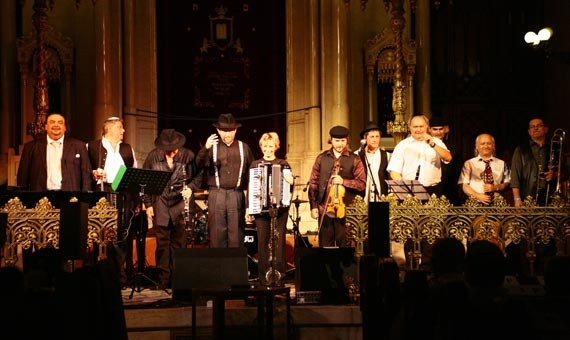Jewish Summer festival kicked off its 12th edition this year. 26 premises and 59 programs awaited those who were interested in Jewish culture.
ONE OF THE BIGGEST annual Jewish festivals held in Europe is organized in Hungary, giving everyone the best opportunity to get to know a rich culture that is still not very well known among non-Jewish Europeans. According to Festival Director Vera Vadas, the Jewish Summer Festival (JSF) is one of Hungary’s most important and most visited cultural events. “I guess the date of this particular festival is exceptionally well-scheduled,” Vadas says. “Summer festivals finish, fall festivals don’t start on that very week, which this year was between Aug 30 and Sep 7,” she explains to Diplomacy and Trade. She notes that the millennia-old Jewish traditions have always attracted huge numbers of attendees.
“The dynamics of the festival's expansion and progress have fulfilled the expected hopes,” she adds, explaining that 12 years ago only a few thousand people were interested, while this yearsaw 120,000 visitors. “Although, this is a layer festival and is hard to be compared with any other festivals.” The festival is being developed year by year, turning more colorful and eclectic. “It is also becoming more popular among foreigners who, as the online ticket sales reveal, look forward to the event. The budget of this year's festival was HUF 98 million (just over USD half a million), and 4% of that was realized from ticket fees. This sum also shows the growing popularity, as well as the fact that more and more towns in the countryside decide to participate the event.”
lnnovations
“Ranking programs in terms of their success is not easy,” the director says. “Klezmer and clerk music is a must on this week, these provide the keystones. Without them, the Jewish festival would not fulfill its purpose, for what it was first created,” she adds. “This year, we combined klezmer with jazz by Nikola Parov’s Quartett and Katica Illényi, for a change, and we try to color the palette every year. Besides these, of course, the festival has its recurring, public favorite artists.” As for changes in the festival program, the organizers launched alternative and innovative concerts, targeting the youth. “Another novelty what we believe will become a tradition maker was the book-fair and market held at the Gozsdu-yard along with cafe discussions, author-reader meetings, street-theatre and music programs with immense success,” Vadas says. Next year, contemporary Israeli authors are planned to be invited for the festival. “With such diversity, we want to point out the importance of cultures to live peacefully with each other,” Vadas continues. “The next major issue in the future is going to be the establishment of the organization entitled ‘Association of the Jewish Cultural Festival’, to strengthen Jewish culture in Hungary as it appears to be the most effective remedy against the still on-going anti-Semitism.”
Highlights
Being a pan-cultural festival, JSF offers almost every segment of Jewish culture to those interested. Highlight of this year’s festival was the performance of the Israel Philharmonic Orchestra under the baton of Riccardo Muti at the Dohány Street Synagogue, dedicated to the spirit of tolerance and peace. The former musical director of La Scala in Milan was conducting Timna Brauer and the Elias Meiri Ensemble, giving the audience a special and unique experience. The Dohány Synagogue and the Jewish Museum were of course the main venues, but the Gozsdu-court was also a hotspot with arts and crafts bazaar, while the re-opened Rumbach Street Synagogue served as a festival venue for classical music concerts. Events were also held at the historical Urania National Film Theatre, attracting the fans of Latin rhythms of the Flamenco Drama King David and Bat-Sheba performed by the Israeli Compas Dance Company, and later the Yiddish Tango Evening with Tango Esperimento. Eszter Horgas and her Class Jazz Band is a returning guest of the festival.
At the Trafo centre, the Hungarian premiere of Edna Mazya’s play ‘Games in the Backyard’ was on stage, performed by KoMa Theatre, while Deák tér’s Gödör Klub offered a fusion of ethnic music in Yiddish, Aramaic and seven other languages with Ezter. Apart from music and theatre, the Festival offered the rare opportunity to see short film by students of the Sam Spiegel Jerusalem Academy, premiering in Hungary at the Kino Movie Theatre. And, as a real treat, there was a Kosher-style wine tasting dinner at Symbol Restaurant in District 3.


Leave a Reply Cancel reply
Top 5 Articles
 MVM Buys Huge Solar Power Plant in Tázlár December 20, 2023
MVM Buys Huge Solar Power Plant in Tázlár December 20, 2023  Tensions Escalate Between U.S. and Hungary after… March 15, 2024
Tensions Escalate Between U.S. and Hungary after… March 15, 2024  Hungarian Central Bank Head Warns of Autonomy Under Threat March 1, 2024
Hungarian Central Bank Head Warns of Autonomy Under Threat March 1, 2024  Hungary Faces Economic Headwinds as Recovery Falters February 16, 2024
Hungary Faces Economic Headwinds as Recovery Falters February 16, 2024  Alpine Comfort at a Mountain Lake December 19, 2023
Alpine Comfort at a Mountain Lake December 19, 2023








No comment yet. Be the first!